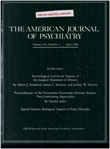The need to integrate liaison psychiatry and geropsychiatry
Abstract
About 30% of medical and surgical inpatients are 65 years old or older, and the latter account for about 30% of referrals for psychiatric consultation. Delirium, dementia, and depressive and anxiety disorders are prevalent in these patients, and liaison psychiatrists are forced to function as (untrained) geropsychiatrists. The author proposes that liaison psychiatrists take over the role of geropsychiatric consultants to elderly medical and surgical inpatients and that fellowships in geropsychiatry-liaison psychiatry be funded to provide appropriate training. Integration of liaison psychiatry and geropsychiatry in general hospitals would provide needed service for the elderly and enhance the stature of liaison psychiatry.
Access content
To read the fulltext, please use one of the options below to sign in or purchase access.- Personal login
- Institutional Login
- Sign in via OpenAthens
- Register for access
-
Please login/register if you wish to pair your device and check access availability.
Not a subscriber?
PsychiatryOnline subscription options offer access to the DSM-5 library, books, journals, CME, and patient resources. This all-in-one virtual library provides psychiatrists and mental health professionals with key resources for diagnosis, treatment, research, and professional development.
Need more help? PsychiatryOnline Customer Service may be reached by emailing [email protected] or by calling 800-368-5777 (in the U.S.) or 703-907-7322 (outside the U.S.).



